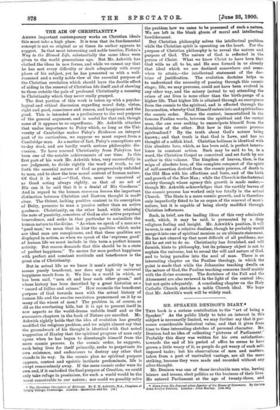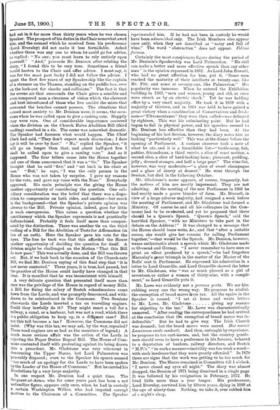MR. SPEAKER DENISON'S DIARY.* THIE4 book is a serious contribution
to the "art of being a Speaker." As the public likely to take an interest in this subject is necessarily limited, we may further say that it pos- sesses considerable historical value, and that it gives from time to time interesting sketches of personal character. Mr. Denison had no idea of collecting "pictures of Parliament." Probably this diary was written for his own satisfaction; towards the end of his period of office he seems to have grown a little weary of it, as people do get weary of such self- imposed tasks; but his observations of men and matters, taken from a post of unrivalled vantage, are all the more striking, because they were made and recorded without any after-thought.
Mr. Denison was one of those invaluable men who, having leisure and means, elect politics as the business of their lives. He entered Parliament at the age of twenty-three, and
• • Notes from M Journal when Speaker of the House of Commons. By the late John Evelyn Denison. London : John Murray. [10a. ed.]
bad sat in it for more than thirty years when he was chosen Speaker. The prospect of his duties in the Chair somewhat awed him, and the counsel which he received from his predecessor (Lord Evereley) did not make it less formidable. Asked whether there was any one to whom he could go for advice, he replied " No one ; you must learn to rely entirely upon yourself." " And," proceeds Mr. Denison after relating the story, "I found this to be very true. Sometimes a friend would hasten to the Chair and offer advice. I must-say, it was for the most part lucky I did not follow the advice. I spent the first few years of my Speakership like the captain of a steamer on the Thames, standing on the paddle-box, ever on the look-out for shocks and collisions." The fact is that the serene air that surrounds the Chair gives a sensible and even-tempered- man a clearness of vision which the cleverest and best intentioned of those who live amidst the mists that surround the benches cannot possess. The situations that caused most anxiety to Mr. Denison were, it seems, the occa- sions when he was called upon to give a casting vote. Happily they were rare. One of considerable importance occurred when the division on the Church Rates Abolition Bill (third reading) resulted in a tie. The scene was somewhat dramatic. The Speaker had foreseen what would hapi)en. The Chief Clerk had said, " They don't expect much discussion ; I dare say it will be over by four." " No," replied the Speaker, "it will go on longer than that, and about half-past five I shall be called upon to give a casting vote." And so it happened. The four tellers came into the House together and one of them announced that it was a " tie." The Speaker thought that he said "five," and "sat back in his chair at ease." "But," he says, "I was the only person in the House who was not taken by surprise. I gave my reasons for the vote, and gave my voice with the Noes." Everybody approved. His main principle was the giving the House another opportunity of considering the question. One sub- sidiary consideration was the belief that there was a dispo- sition to compromise on both sides, and another—but much in the background—that the Speaker's private opinion was adverse to the Bill. Private opinion, indeed, goes for little in such emergencies. This raises a question whether the constituency which the Speaker represents is not practically disfranchised. Probably it feels itself more than compen- sated by the distinction. There was another tie on the third reading of a Bill for the Abolition of Tests for Affirmation (in lieu of an oath). Here the Speaker gave his vote for the Ayes. The line he took was that this afforded the House another opportunity of deciding the question for itself. A division might be challenged on the Motion "That this Bill do now pass." This was actually done, and the Bill was thrown out. But, if we look back to the occasion of the Church-rate Bill, we find Mr. Denison saying of this final step that " it is now never contested." Three years, it is true, had passed, but the practice of the House could hardly have changed in that time. It is manifest that he was inconsistent with himself.
A very delicate question that presented itself more than once was the privilege of the House in regard of money Bills. A Bill for fixing the salary of Scotch schoolmasters came down from the Lords, and was promptly denounced, and with- drawn to be reintroduced in the Commons. Two Sessions afterwards the Lords inserted a tax on travelling engines. Could they lawfully do it P They might enact a toll for a railway, a canal, or a harbour, but was not a road, which there is a public obligation to keep up, in a different case ? Did not this toll become a tax ? However, the 00111M0118 did not insist. (Why was this tax, we may ask, by the way, repealed? These road engines are as bad as the monsters of legend.) A much more serious affair was the action of the Lords in rejecting the Paper Duties Repeal Bill. The House of Com- mons contented itself with protesting against its being drawn into a - precedent. Mr. Gladstone was very vehement in denouncing the Upper House, but Lord Palmerston was peaceably disposed; even to the Speaker his speech seemed
too much of an apology for the Lords to have been spoken by the Leader of the House of Commons." But he carried his Resolutions by a very large majority.
In one respect Mr. Denison had a quiet time. The Sergeant-at-Arms, who for some years past has been a not unfamiliar figure, appears only once, when he had in custody a certain Washington Wilkes, who had imputed corrupt motives to the Chairman of a Committee. The Speaker reprimanded him. If he had not been in custody he would have been acknoniehed only. The Irish Members also appear once only, when they are described as " noisy and full of wine." The word " obstruction " does not appear. Fetices fuimue.
Certainly the most conspicuous figure during the period of Mr. Denison's Speakership was Lord Palmerston. " He still can make a better and more effective speech than any other man " is the opinion expressed in 1862. As Lord John Russell, who had no great affection for him, put it, "Some men reached the maturity of their intellects at twenty-one, like Mr. Pitt, and some at seventy-one, like Palmerston." His popularity was immense. When he entered the Exhibition building in 1862, " men and women, young and old, at once were struck as by an electric shock." Yet he was holding office by a very small majority. He took it in 1859 with a majority of thirteen, and in 1864 was held to have gained a great victory when a combination of Conservatives and Irish- men—" Ultramontanes" they were then called—was defeated by eighteen. This was his culminating point. But he had begun to fail in physical power, and his speeches seemed to Mr. Denison less effective than they had been. At the beginning of his last Session, however, the diary notes him as looking "particularly well." This was at the dinner before the opening of Parliament. A curious observer took a note of what he ate, and it is a formidable list—" turtle-soup, fish, patties, fricandeaux, a third entree, a slice of roast mutton, a second slice, a slice of hard-looking ham; pheasant, pudding, jelly ; dressed oranges, and half a large pear." The wine-list, however, was very moderate,—" a glass of sweet champagne and a glass of sherry at dessert." He went through the Session, but died in the following October.
Mr. Gladstone's name appears, of course, frequently, but the notices of him are mostly impersonal. They are not admiring. At the meeting of the new Parliament in 1868 he had nearly made a grave blunder of form. Mr. Disraeli, in view of a large adverse majority, had resigned a week before the meeting of Parliament, and Mr. Gladstone had formed a Ministry_ Of course he and all his colleagues (in the Com- mons) had to be re-elected, and yet he proposed that there should be a Queen's Speech. " Queen's Speech," said the horrified Speaker, " with no Ministers to take part in the debate on the Address !" It was changed to a message that the House should issue writs, 81c., and that "after a suitable recess, she would give her reasons for calling Parliament together,"—that would be the Speech. Mr. Denison, however, waxes enthusiastic about a speech which Mr. Gladstone made re Ovevend and Gurney. " I never remember to have seen so great an effect produced by a speech,"—he had forgotten Macaulay's great triumph in the matter of the Master of the Rolls' seat in Parliament. He expressed his admiration in a letter to Lord Granville, and Lord Granville showed the letter to Mr. Gladstone, who "was as much pleased as a girl of seventeen, or rather a woman of thirty-nine, with a compli- ment," as Lord Granville puts it.
Mr. Lowe was evidently not a persona grata. We see him rubbing every one the wrong way. He proposes to abolish the exemption of brood mares from tax. All the squire in the Speaker is roused. "I sat at home and wrote letters to Mr. Lowe, Mr. Gladstone giving my reasons for objecting to the tax." Mr. Lowe was characteristically unmoved. " After reading the correspondence he had arrived at the conclusion that the exemption of brood mares was in- defensible." But he had to give way. The Irish Church was doomed ; but the brood mares were sacred. Hoc nocuit Lagniarunt caede madenti. And then, untaught by experience, he proposes to tax cart-horses, and, lest the country gentle- men should seem to have a preference in his favours, behaved to a deputation of bankers, railway directors, and Scotch " M.P.'s " " in such a manner—incivility was too weak a word- • with such insolence that they were greatly offended." In 1870 there are signs that the work was getting to be too much for Mr. Denison. The House remained in Committee till 1 o'clock, " I never closed my eyes .all night." The diary was almost dropped, the Session of 1871 being dismissed in a single page It was followed by his resignation in February, 1872. He lived little more than a year longer. His predecessor, Lord Eversley, survived him by fifteen years, dying in 1888 at the age of ninety-four. Nothing, we take it, ever robbed him of a night's sleep.



































 Previous page
Previous page